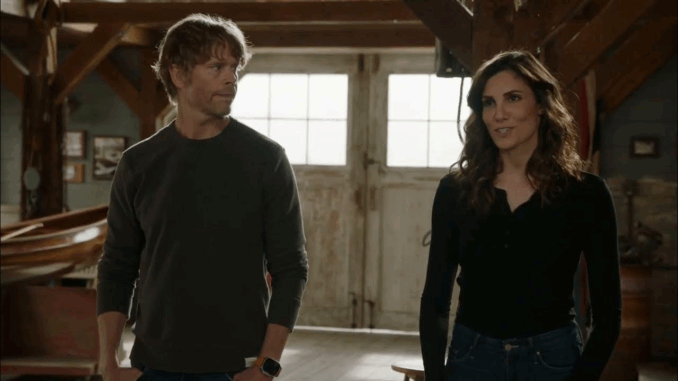
While Daniela Ruah captivated audiences for fourteen seasons as the tenacious Special Agent Kensi Blye on NCIS: Los Angeles, her talents extended beyond her compelling on-screen presence. Throughout the show’s run, Ruah also stepped behind the camera, showcasing her keen eye for storytelling and her ability to helm emotionally resonant narratives. One such episode that stands out is Season 14, Episode 7, titled “Flesh & Blood,” which tackled the sensitive and crucial issue of domestic violence, a subject matter that allowed Ruah to bring a unique perspective and depth to the storytelling.
A Natural Evolution: Ruah’s Journey into Directing
Ruah’s transition into directing wasn’t a sudden leap but rather a gradual and passionate evolution. Even during her busy schedule as a lead actor on NCIS: Los Angeles, she actively sought opportunities to learn the craft of directing, eventually helming several episodes of the show. This hands-on experience allowed her to hone her skills, develop her own directorial style, and build confidence in leading a production from behind the lens. Her dedication to learning every facet of filmmaking demonstrated a deep commitment to the art of visual storytelling.
“Flesh & Blood”: Tackling a Difficult but Necessary Subject
The episode “Flesh & Blood,” which aired during Season 14, presented a particularly challenging and emotionally charged narrative. The case revolved around the murder of a Navy officer, with the initial suspicion falling on his wife, Clarice (Marnee Carpenter), who was found fleeing the scene. However, as the NCIS team delved deeper, they uncovered a harrowing history of domestic violence perpetrated by the deceased husband against Clarice. This storyline provided a platform to explore the complexities and devastating impact of spousal abuse, a topic often shrouded in silence and shame.
A Sensitive Approach: Ruah’s Vision for the Episode
As the director of “Flesh & Blood,” Daniela Ruah brought a distinct sensitivity and perspective to the portrayal of domestic violence. In interviews surrounding the episode, Ruah emphasized the importance of handling the subject matter with care and authenticity. Her approach focused on highlighting the victim’s experience, the psychological manipulation involved in abusive relationships, and the courage it takes to break free. As a female director, Ruah’s lens likely brought a nuanced understanding of the emotional landscape of domestic violence, allowing for a portrayal that resonated with empathy and truth.
Connecting Through Shared Experience: Deeks’s Personal Tie
The episode also intricately wove in the backstory of Marty Deeks (Eric Christian Olsen), revealing his own childhood experience growing up in a home where his father was abusive towards him and his mother. This personal connection allowed Deeks to empathize deeply with Clarice and provided a powerful emotional anchor for the episode. Ruah skillfully directed the scenes where Deeks shares his past with Clarice, creating moments of profound understanding and connection. These scenes, praised for their raw emotion and authenticity, underscored the lasting impact of domestic violence across generations.
Working with the Actors: Creating Moments of Truth
Ruah credited her actors, particularly Marnee Carpenter and Eric Christian Olsen, for their powerful and truthful performances in the episode. She spoke about creating a safe and supportive environment on set that allowed them to tap into the difficult emotions required for the storyline. Her direction focused on allowing the actors to embody their characters’ emotional journeys, capturing the subtle nuances of fear, resilience, and the struggle for survival. Ruah’s experience as an actor herself likely provided her with a unique understanding of how to communicate with and guide performers through such sensitive material.
Beyond the Procedural: Focusing on the Human Element
While NCIS: Los Angeles was known for its action-packed sequences and intricate investigations, “Flesh & Blood” prioritized the human element of the story. Ruah’s direction emphasized the emotional toll of domestic violence, not only on the victim but also on the investigators working the case. The episode served as a powerful reminder that behind the crime-solving lies the profound impact of violence on individuals and families.
A Lasting Impact: Raising Awareness and Fostering Empathy
By tackling the issue of domestic violence head-on, “Flesh & Blood,” under Daniela Ruah’s direction, had the potential to raise awareness and foster empathy among viewers. The episode’s sensitive portrayal of the victim’s experience and the exploration of Deeks’s personal connection could have resonated deeply with individuals who have been affected by similar situations. Television dramas have a powerful platform to shed light on important social issues, and Ruah’s work on this episode exemplified that potential.
Conclusion: A Meaningful Contribution to Storytelling
Daniela Ruah’s direction of the NCIS: Los Angeles episode “Flesh & Blood” stands as a testament to her growth as a filmmaker and her commitment to meaningful storytelling. By tackling the difficult subject of domestic violence with sensitivity and depth, she created an episode that was not only compelling drama but also a poignant exploration of human resilience and the importance of connection in the face of trauma. Her ability to draw powerful performances from her actors and to focus on the emotional core of the narrative made “Flesh & Blood” a standout episode in the show’s long run and a significant achievement in Ruah’s burgeoning directorial career.